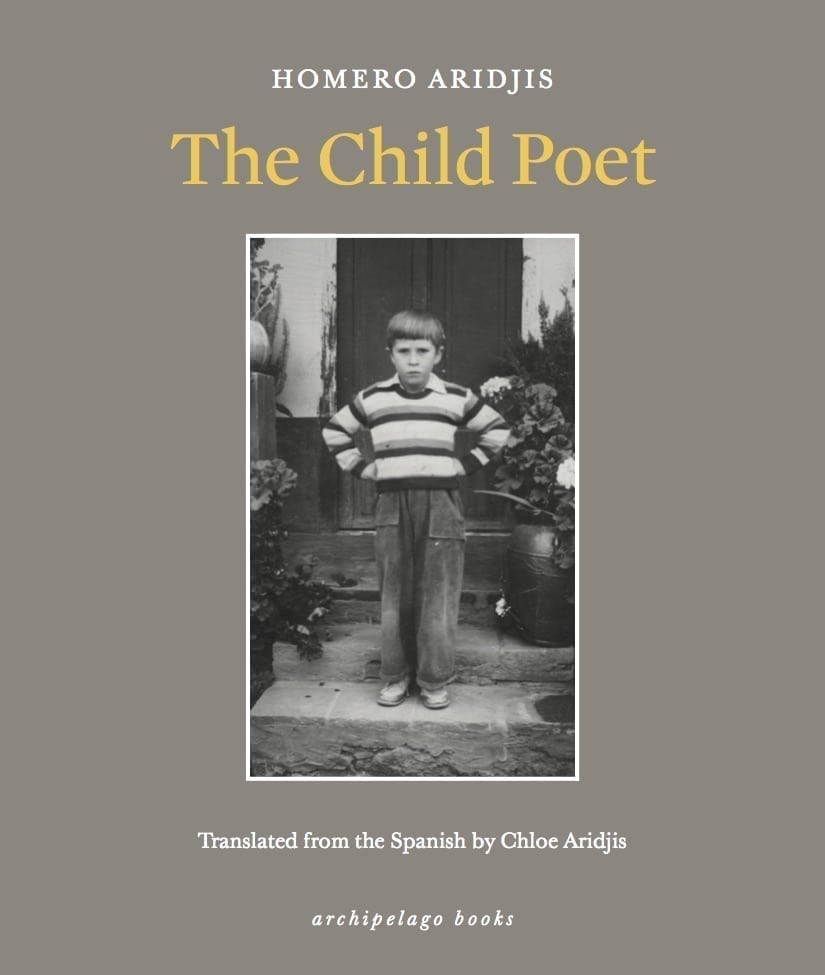Book Description
The Child Poet is an evocative memoir of a child’s dreams, in a stunning translation by the author’s daughter.
A celebration of the poet’s life before 1951. Imminent fatherhood helped revive memories that had, for two decades, lain dormant. This work, narrated in a succession of interconnected vignettes, provides a portrait of Homero Aridjis in his pre-poet years. A child at a time when sights and sensations were still delivered at their purest, when each day brought new perceptions of his mother and his father, when every villager in Contepec formed part of a personal mythology. It was a time when shadows were palpable and light had a sound of its own.
In the poetry of Homero Aridjis there is the gaze, the pulse of the poet, the discontinuous time of practical and rational life and the continuity of desire and death: there is the poet’s primal truth.
— Octavio Paz
The poetry of Homero Aridjis is a symbol of love. His work is very beautiful, above all, his style is very original, very novel.
— Juan Rulfo
Homero Aridjis' poems open a door into light.
— Seamus Heaney
A great flame passes through the words, the poetry of Homero Aridjis, who sets reality alight in images that at once illuminate and consume it, making life a sister of dream. Homero is a great poet; our century has great need of him.
— Yves Bonnefoy
Thus the poet (the 'child poet' who alone sees and perceives everything, even terror and ecstasy) is the one who opens the way. He acts on impulses, led by intuition rather than reason --- for even reason must be abandoned at the very last instant, as Islamic mystics teach, to make way for ecstasy. He is the first to perceive the fate of the world. To attain knowledge, one must:
Burn the boats/ that the old shadows / will not follow us / to the new land
— J. M. G. Le Clézio
Homero Aridjis catapults himself back into his village childhood—he crosses an abyss—in this tender, vivid, and precise dream of a book, a vocation foreshadowed, beautifully described and foretold.
— Edward Hirsch
Proust meets magical realism in this searching, lyrical memoir...
— Kirkus Reviews
James Schuyler once said that the “writing poems part” is easy. It’s the rest of the poet’s time that’s the problem. Homero Aridjis believes his own poet’s life began after a gun injury in childhood. The injury created the poet yet he is proposing too that childhood is poetry, an accumulative first encounter with the stuff that the rest of the life will be working through. The writing here is awesomely beautiful—rich, kinetic and even macabre like Aridjis’s simple account of a friendship struck up with a lamb who next day was lunch and how movingly the child refused to eat his friend. I’m aware throughout that this quick and lucid feeling translation is the product of Chloe Aridjis, the poet’s daughter. To be medium to the matter-of-fact privilege of a male child coming into his own in a man’s world, particularly when that child is your future illustrious dad brings a fantastic and even trans glow to this baroque and embodied tale of youth understanding in hindsight his future powers.
— Eileen Myles
Colorful [and] entertaining ... Aridjis’s dream-induced memories confer reality on his forgotten history. The result is not an “insubstantial double” of a bucolic childhood, however: here, thanks in part to Chloe Aridjis’s exquisite translation, the shadows themselves are “green.”
— Sophie Hughes, Times Literary Supplement
Homero proves to have a febrile, discerning sensitivity.
— Walter Biggins, Quarterly Conversation
[The Child Poet] is a deft novella, a moving journey through childhood in rural Mexico told in simple poetic language.
— Tony Messenger
Aridjis’s imagery is childlike in the best possible sense. It reflects the wonder of seeing things for the first time, the wonderment of dawning awareness, before ending with a sudden, declarative terseness that announces his arrival as a poet...
— David Shook, The Poetry Review
Elegantly translated ... with language both evocative and sparse.
— World Literature Today
—
—

